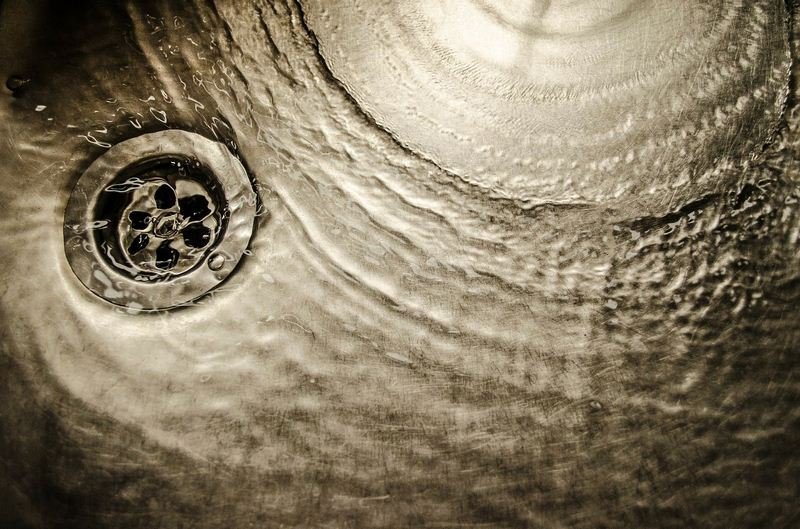Table of Contents Show
It is common for homeowners to notice clogged drains once in a while. The water does not flow out as fast as it should, and you might even hear gurgling noises as the water backs up in the pipe.
Every homeowner has a mélange of different drain cleaners ready under the sink to combat this clogging problem. In fact, drain cleaners are one of the most common items you will find in any American home for some DIY plumbing troubleshooting.
Using them is easy too. Some of them come ready for direct use; you just have to pour them into the drain, add some water, let it sit for 30-minutes and then continue washing dishes or whatever you were doing.

What Cleaners Should You Never Use to Clean Clogs?
These ready-to-use drain cleaners are perfect for city dwellers, whose homes have a direct connection to the city sewers. However, households with septic tanks have to be a little more careful than them.
Some of the most common ingredients in the drain cleaners can damage the septic systems. Here is a list of chemicals you need to watch out for:
- Bleach
- Ammonia
- Harsh detergent, soaps, and lotions.
Although many of us rely on the pocket-friendly options of using bleach for cleaning out the clogs, we should be cautious while using it. These harsh chemicals can wreak havoc on the natural flora and fauna that dwell in the septic system.
Multiple colonies of bacteria live down there that help in the breakdown of organic waste. When you put copious amounts of bleach and ammonia down the drain, you jeopardize their living environment. They can wipe out millions of bacterial colonies at one go.
Read Also:
- Deciphering the Meaning of Plumbing Sounds Should Help Early Detection of Plumbing Problems
- Keep Your Drain Pipe Clean with a Good Kitchen Sink Strainer
- Signs You Can’t Ignore: When to Call for Septic Tank Service
- How to Eliminate Bad Odours from Your Bathroom for Good
- Common Residential Plumbing Problems: What are they?
- Top Ways to Deal with Drains Clogged with Hair
- 7 Green Home Cleaning Hacks You Must Try
What Should You Use to Clean Your Clogged Drains?
Here are some septic system approved alternatives you should use instead:
- Baking soda and vinegar
- Salt, baking soda and boiling water
- Septic safe drain cleaners
You can find the septic system safe drain cleaners at all hardware and maintenance stores. Or, you can look for discounted ones online. They will help keep your septic system healthy for years to come.
Here are some methods that work for unclogging the drain without harming the useful bacteria down there:
Pouring Hot Water
A minor clog is annoying, but taking care of it early will save you money and effort. Hot water is perfect for loosening all kinds of grease and soap clogs. Bring a pan of water to boiling point and pour it directly down the drain. Gushing water can also loosen clogs of hair.
Baking Soda and Vinegar
In case the trick with hot water does not work, you can try mixing baking soda with vinegar. Make sure to dump at least 3-4 tablespoons of baking soda directly down the wet drain. Do not add any water after adding the baking soda. Pour half a cup of vinegar directly into the drain. Do not dilute the vinegar. The acid and base will start a neutralization reaction that creates a fizz.
You might see bubbles erupting out of the drain. Do not worry. It is entirely harmless for the colonies living down the septic tank. Once it stops, pour some water and check the flow. If the flow isn’t satisfactory, you can repeat it once more.
Hydrogen Peroxide, Salt, Baking Soda and Vinegar
According to several experts, using hydrogen peroxide in a combination of vinegar and water can do the trick too. You should mix ½ cup of 3% hydrogen peroxide (H2O2) and half-a-cup of regular white vinegar. Add 1 cup of baking soda, 1 cup of salt and mix them before pouring the mixture into the drain directly.
You can add some water to dilute the hydrogen peroxide further. It should open the stubborn clogs in the drain quite quickly. Complete the cleaning process by pouring some boiling water. Check the flow once you clean the drain. If it does not work, repeat the process once before calling the plumber or using branded septic-safe cleaning products.
Septic-safe Drain Cleaners
If you are not much of a DIY person, you might want to try these septic system safe drain cleaners. They do not use bleach or ammonia to unclog the drain. Drain cleaners for homes with septic systems are different from the regular cleaners.
Ensure the safety of the item you are buying before using it. It is the last thing you should try before calling the plumber. Choose enzyme based no caustic drain cleaners to preserve the lifespan of your septic system. These enzymes are entirely natural and harmless towards the bacteria that live in the septic systems.
Using a Drain Cleaning Contraption
You may also want to use wire cleaners or drain snakes to clean the trapped hair from your sink or bathroom drain. Our experience shows that most bathrooms face slow drainage problems due to large quantities of hair stuck in the drainage system.
Flushing the drain with hot water after snaking it always helps to remove the small strands and soap clogs that you may have missed.
Calling the Pros
If none of the above hacks work, you should get ready to call the plumber. Hiring professional help might seem unnecessarily expensive, but it is essential for preserving the integrity of your home septic system.
Sometimes, chemicals are not enough to clean the clogs. Some manual intervention is necessary to remove the lodged hair and debris. It is especially common for bathroom drains to become slow over time by collecting hair, soap and makeup products.
If the chemicals fail to clear the flow, a plumber can remove the stopper; clean the hair and other stuff around the stopper, wash it, and do the necessary cleaning before putting the stopper back in place. Get in touch with BBB Septic Design Service and water heater repair dallas for the best services.
Ideally, nothing should go down the drain other than human waste and water. However, that is not the case for most homes. Most drains require a little TLC to run correctly. Choosing the right products to clean your drain should also keep the septic tank healthy and safe. Always check the products you are using if you have a septic tank at home.









